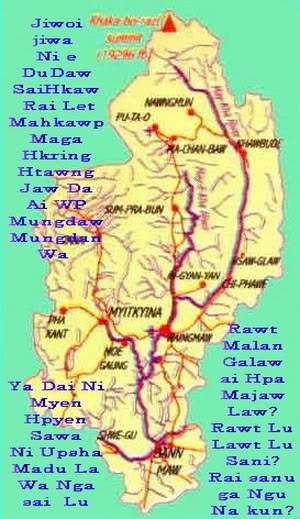By FRANCIS WADE
The new Burmese flag to be hoisted following elections this year is evidence of the ruling regime’s attempt to wipe out ethnic armies, Burma observers say.
An image of the new flag obtained by DVB shows a complete revamp of both colour, design and symbols: in place of a largely red flag with a blue square in the corner hosting a paddy ear, cog wheel and 14 stars comes a flag dominated by one single star in the middle, with three yellow, green and red stripes behind.
Analysts believe that the removal of the 14 stars, which signify the 14 divisions and states in Burma, or indeed their assimilation into one larger star, is further proof that citizens of a post-election Burma will live under the dominant control of the military government
.
“It’s a sign of the original agenda [the junta] had after the British left; the Burmanisation of the country,” said Saw Taw Wa from the Karen National Union (KNU) Peace Council. He added that it was a “step-by-step process” which has already taken root in the formation of ethnic Border Guard Forces aimed at “causing division within the ethnic states”.
The Burmese government has been attempting, sometimes aggressively, to transform the country’s 18 ceasefire groups into border militias, which will bring them under direct control of the ruling generals. Saw Taw Wa said that the junta has been supporting pro-government ethnic groups, such as the Democratic Karen Buddhist Army (DKBA), with money and arms “to eliminate ethnic armies”.
Many have however resisted and decades-old ceasefires are now on tenterhooks, leading to fears in Burma’s ethnic border regions that fighting will erupt.
Khin Ohmar, chairperson of the Network for Democracy and Development (NDD), said that the new flag was a sign that the junta was “solidifying their power into one star – the unity of the union; that every ethnic group is together as one”.
Further evidence is found in Article 338 of the 2008 constitution which will come into force following the elections this year. It states that “all the armed forces in the Union shall be under the command of the Defense Services”. Khin Ohmar said that it proves the junta is “consolidating…everything by force and by assimilation”.
“When I look at this attempted assimilation – all ethnic groups have to follow the traditional Burmese dances, for example – it’s unbelievable; really disgusting to me. That is a very clear sign that the one big star really is their power.”
The official name of Burma is also due to change, from the current Union of Myanmar to the Union Republic of Myanmar.
“With the name, they are being very clear that Burma is no longer a federal state, but will be a republic – they are totally denying indigenous rights,” said Saw Taw Wa.
Ethnic conflict in Burma has gradually eaten away at the roots of society, with millions now displaced and areas of the country littered with landmines. The 60-year long conflict between the Karen National Union and the ruling junta is thought to be one of the world’s longest running.
May 21, 2010
Subscribe to:
Post Comments (Atom)
WUNPAWNG MUNGDAN SHANGLAWT HPUNG A NINGGAWN MUNGMASA
WUNPAWNG MUNGDAN SHANGLAWT HPUNG A NINGGAWN MUNGMASA
CHYE JU KABA SAI
Sa Du N'Gun Jaw La ai Majaw N'chying wa Chyeju Dum Ga ai,Yawng a Ntsa Wa Karai Kasang Kaw na N'Htum N'Wai ai Shaman Chye ju Tut e Hkam La Lu Nga mu Ga law








No comments:
Post a Comment